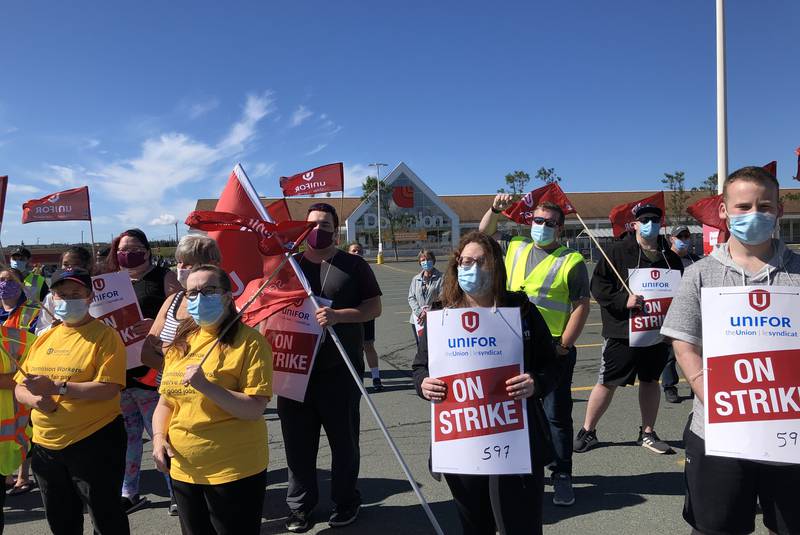
Since Aug. 22, more than 1,400 Dominion grocery store employees from all 11 stores across Newfoundland and Labrador have been on strike. The spark for this strike was Dominion taking away the $2 “hero pay” for essential workers during the pandemic. This higher wage is supposedly too much for the bosses to pay, despite their profits continuing to increase. Dominion employees have also been without a contract since October 2019 when Loblaws downgraded 60 positions to part-time, making over 80 percent of Dominion’s staff part-time workers. This has led to a loss of wages, benefits, and pensions.
Loblaw, Dominion’s parent company, reported a revenue of $12 billion dollars for the second quarter of 2020. The Weston family, who own the majority stake of Loblaw companies, is one of the richest families in Canada, and has an estimated net worth of $13.55 billion dollars. Despite this vast wealth, the Westons maintain that they can’t afford to pay their workers decent wages. Or, as Newfoundland comedian John Sheehan put it, “You’re out here looking for $2 dollars an hour. Do you know how many billions that’s going to leave him? Nope, because you’re only thinking about yourselves!” Loblaw has gone so far as to file an injunction against the striking workers.
The injunction prevents Dominion workers from blocking or interfering with employees, agents or contractors who are accessing the stores. The injunction also forces the union to remove the barricades set up at the entrances and exits. This begs the question, what are picket lines for? Loblaw has accused workers of blocking customers from accessing pharmacies and preventing trucks with perishable food being delivered to food banks from leaving. The workers have made it clear they are not interfering with the pharmacy. The striking workers have even offered to help coordinate deliveries to the food bank, but Loblaw declined.
There is a lot at stake for Loblaw. Dominion workers were the first workers in Loblaw-owned businesses whose contracts had expired, but many other contracts are about to end in the coming period. Loblaw is terrified of losing the battle with workers in Newfoundland because it will embolden workers all across Canada. As Chris MacDonald, assistant to the National President of Unifor, stated, “”I don’t think that anybody in Newfoundland is happy with what’s going on here. The strings are being pulled from Toronto. This is about them not wanting to set a national wage pattern.” Unsurprisingly, Loblaw has claimed that they cannot afford to pay the hike in wages and the costs for converting part-time jobs into full-time. However, they have refused to open up their books to the union.
The Dominion workers are fighting a valiant battle, but they cannot win this alone. MacDonald has stated that Unifor is reaching out to workers of the Loblaw brands across the country in order to raise the “conversation nationally”. Jerry Dias, head president of Unifor, has also stated that it is still too early to call for a national boycott of Loblaw.
While Unifor 597 members have begun to receive one-time payments as part of the federal government’s Essential Worker Support Program, there are signs of fatigue as the strike approaches the end of its second month. One striking worker sent a direct message to Galen Weston, executive chairman of Loblaw, pleading for a “change of heart” and describing her growing struggle to make ends meet. But such pleas are unlikely to garner sympathy from the likes of Weston. For capitalists, the imperative to maximize profits at all costs always overrides the needs of workers and they are more than willing to starve their workforce into submission.
The Weston family is absolutely terrified of the threat posed by their workers taking mass job action. But for Newfoundland workers, it is the only way to gain better wages and more secure jobs. The greatest fear of the Westons is that the Dominion strike will embolden Loblaw workers across Canada. These workers should be emboldened; in the fight for good wages and job security, they can show how powerful they are by taking strike action. Bold collective action from workers at Loblaw brands would have repercussions across the entire labour movement. It would help bring back the bold militancy the labour movement needs as a whole. Ultimately, this would better the condition for all workers in Canada.
Victory to the Dominion workers!

